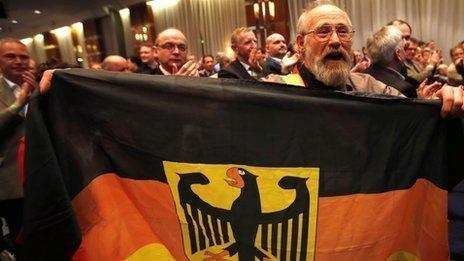Eurozone crisis colours German election campaign
- Published
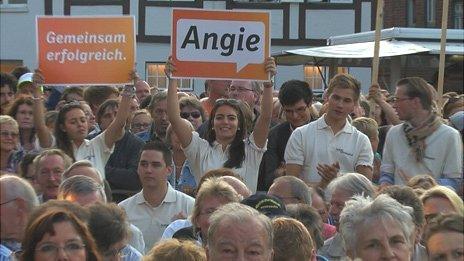
Rendsburg: "Successful together" is Chancellor Merkel's campaign slogan
Angela Merkel does not really do razzmatazz.
But as she climbed on stage for an early evening rally in the town of Rendsburg, on the Kiel Canal north of Hamburg, her supporters were happy enough.
"Our country is doing very well at the moment," she told them to polite applause. "We are the anchor of stability for Europe, the motor of growth."
The campaign to decide who will be the continent's most powerful politician for the next four years is in full swing.
But most Europeans do not have a vote in this.
Germany's federal elections take place on 22 September and Mrs Merkel is a strong favourite to win a third term as chancellor.
Coalition politics could still complicate things, but she is by far the most popular political leader in the country.
Inevitably, much of the focus of the campaign is on domestic themes, the bread-and-butter issues of daily life.
Leadership role
But a sizeable chunk of Mrs Merkel's speech in Rendsburg was devoted to the eurozone crisis, and her determination to fix it.
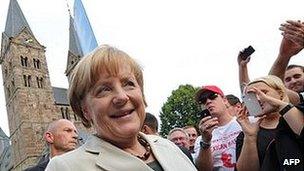
Mrs Merkel remains the most popular political leader in the country
"Her foreign policy agenda has one main point, and that is saving the euro," said Josef Joffe, editor of the Hamburg-based weekly newspaper Die Zeit.
And as the crisis has developed, and policymaking in the eurozone has become more closely co-ordinated in response, Germany has become Europe's undisputed leader.
That means the result of this election matters more than ever to the 250 million or so people who live in the eurozone but outside Germany.
In Rendsburg, Angela Merkel argued that Greece should never have been allowed to join the single currency in the first place, and she blamed her predecessor, the former Social Democrat (SPD) leader Gerhard Schroeder, for allowing it to happen.
But Europe, she emphasised, is of crucial importance to Germany.
"For that reason, the euro is also more than a currency, and we have always shown solidarity. But solidarity has to be coupled with individual responsibility, with reforms in those countries that we are helping.
"They are like two sides of the same coin."
It is a familiar argument, and blaming Mr Schroeder was designed to deflect criticism from her opponents that she has not been honest about the fact that Germany will probably have to pay more to bail out Greece again in the future.
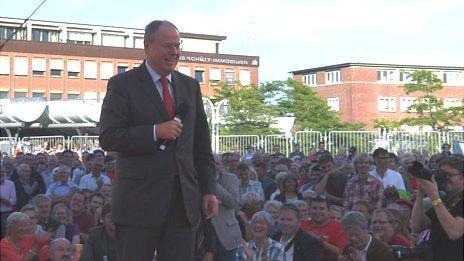
The SPD's Peer Steinbrueck accuses Mrs Merkel of souring relations with Germany's EU partners
Healthy data
Perhaps she need not have worried. Her main challenger in this election, another Social Democrat, Peer Steinbrueck, has attacked her European policy without making much of an impact in the opinion polls.
In a Turkish restaurant on the outskirts of Hamburg he told me that Germany needs to rethink its role in and with Europe.
"German leadership in the eurozone is an interesting subject for many Germans," he said. "And I think it makes no sense just to compel other countries to consolidate their public budgets. This is not enough. They also need more economic stimulus."
The trouble with translating that argument into electoral votes is that many Germans think they have done pretty well out of the eurozone crisis.
Unemployment is low, and recent official figures suggest the country has saved 40bn euros (£34bn; $53bn) by paying less to borrow money on the markets than it had budgeted for.
Mr Steinbrueck, however, is adamant.
"We have to launch a programme immediately against very high and very dangerous unemployment of young people - in Spain and Greece in particular, but also in Italy," he said. "I think European leaders have failed up until now to implement such initiatives."
So there are real differences of emphasis between the main parties on European policy. But it is still possible that they could join forces after the election in a grand coalition.
Diplomatic challenge
Mrs Merkel's current coalition partners, the liberal Free Democrats, are hovering dangerously close to the 5% threshold for winning seats in the Bundestag.
"With a new coalition partner, Berlin could become a bit more pro-integration in the eurozone," said Carsten Brzeski, chief economist for Germany at ING Bank.
"But don't forget this is Germany, and Germany doesn't like sudden change."
For now, the election is clearly Angela Merkel's to lose. It would be a big surprise if anyone else inherited the responsibility of deciding how quickly to move forward with fiscal or banking union in the EU.
"Primacy in Europe has fallen into Mrs Merkel's lap like an overripe plum," observed Josef Joffe from Die Zeit.
"There she is and she doesn't quite know what to do with it. Everyone is looking to Germany for leadership, but when Germany puts down its foot everyone starts screaming."
That means that imposing economic reform on smaller countries like Greece and Portugal is one thing; persuading Italy or France is quite another.
So whoever wins this election - and it looks set to produce continuity rather than change - will face the same tough European challenge.
"The Germans are big and very powerful," Mr Joffe concluded, "but they don't quite have the legitimacy to wield the conductor's baton".
- Published3 June 2019
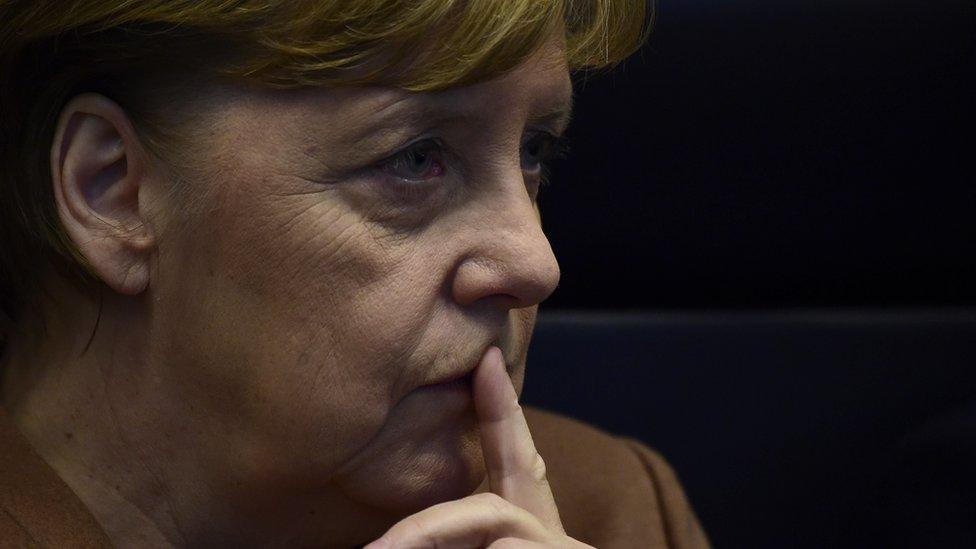
- Published22 September 2013
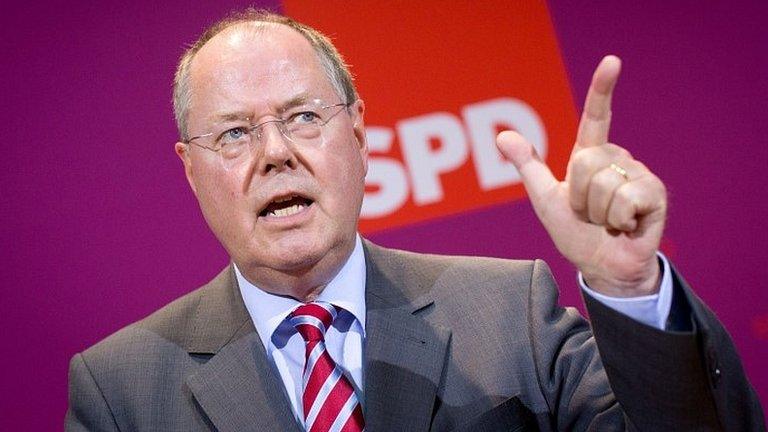
- Published4 September 2023
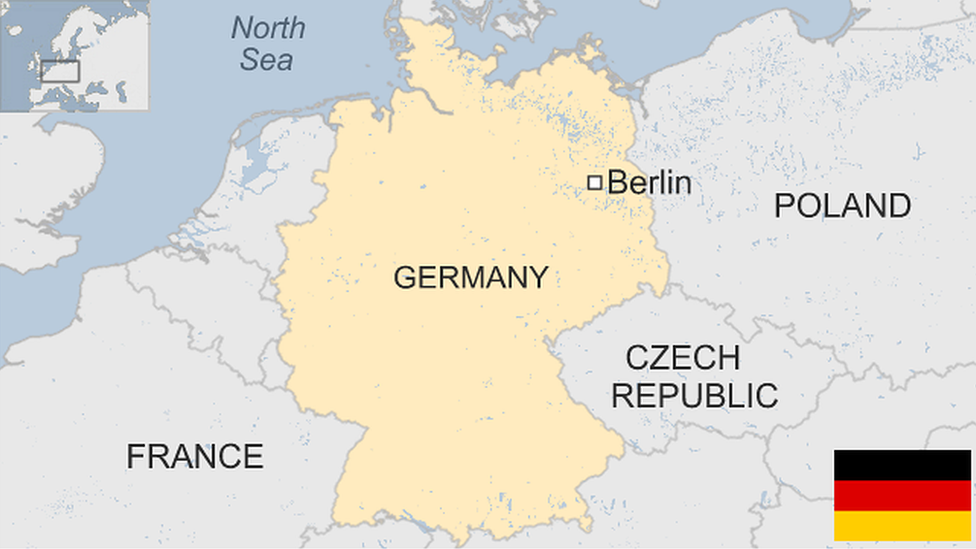
- Published27 August 2013
